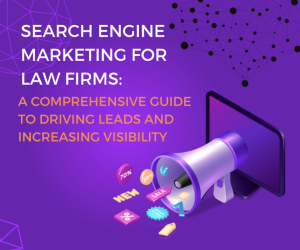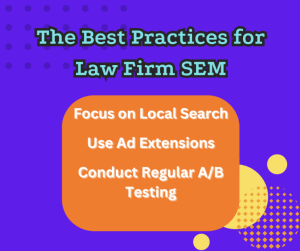Go to Page Section:
Search engine marketing is crucial for law firms seeking to improve their online presence.
As the legal industry grows more competitive, law firms need effective ways to stand out and attract new clients.

SEM is one of the most powerful tools for achieving this goal.
What Is Search Engine Marketing?
Search engine marketing is a digital strategy that uses paid advertising to increase a website’s visibility in search engine results pages (SERPs).
SEM is highly effective for law firms, particularly in competitive areas like personal injury, corporate law, or criminal defense, where numerous firms are vying for attention.
In the context of search engine marketing, SEO also plays a significant role.
Many firms focus on mastering both paid and organic strategies to dominate search results.
For those who want to delve deeper into the subject, consulting a dedicated guide to lawyer SEO from search engine optimization agencies is a great way to gain insights.
Trustworthy resources from a recognized digital marketing agency, such as SeoProfy, can help law firms optimize their digital presence further.
They can also improve overall campaign results when combined with SEM efforts.
Key Components of SEM for Law Firms
To maximize the effectiveness of SEM, law firms need to understand its two primary components: paid search ads and display ads.
These advertising types work differently, but both can play a critical role in attracting potential clients.

Paid Search Ads
Paid search ads, often referred to as pay-per-click (PPC) advertisements, are the most direct way for law firms to reach potential clients who are actively searching for legal services.
These appear at the top or bottom of search engine results pages when someone types in a query related to your practice areas, such as a personal injury lawyer or criminal defense attorney.
How Paid Search Ads Work
- Keyword targeting: Paid search advertisements rely on bidding for keywords that are relevant to your law firm’s services. You choose specific keywords or phrases that potential clients are likely to use in search queries, such as divorce attorney or business lawyer near me.
- Ad auction: Search engines like Google run an auction every time a user enters a search query. Law firms bid on the keywords they want their ads to appear for. However, the highest bidder doesn’t always win; factors like ad quality, relevance, and expected click-through rate also influence the auction.
- Cost-per-click (CPC): Law firms are charged every time a user clicks on their ad, hence the name pay-per-click. The cost varies based on the competitiveness of the keyword, with legal terms often being among the most expensive due to high demand.
Benefits of Paid Search Ads for Law Firms
- Immediate visibility: Paid search advertisements give law firms instant exposure at the top of search results, even if the firm’s website doesn’t rank well organically.
- Targeted audience: You can reach individuals who are specifically searching for legal help, making these advertisements particularly effective for capturing high-intent leads.
- Flexibility: Paid search ads allow for precise control over the law firm’s marketing budget, keywords, and geographical targeting, so you can fine-tune your campaign for optimal performance.
Display Ads
Display ads are another important component of SEM that offers law firms a broader reach.
Unlike paid search advertisements, which appear when users actively search for legal services, display ads are shown on various websites across the internet, reaching users who may not be actively searching but have shown interest in legal services.
How Display Advertisements Work
- Visual appeal: Display ads are banner or image-based advertisements that appear on partner websites within the Google Display Network or other advertising platforms. They can be visually engaging, containing images, logos, and concise text that promote your law firm.
- Audience targeting: These ads are typically served to users who have shown previous interest in legal services or have visited law-related websites. They can also target users based on demographics, interests, or behaviors.
- Remarketing capabilities: One of the most effective uses of display ads is for remarketing. If a potential client visited your law firm’s website but didn’t convert, you can retarget them with display advertisements, reminding them of your services and encouraging them to return to your site to take action.
Tips for Effective Display Ads
- Design matters: Since display ads are visual, the design should be professional and reflect your firm’s brand. Include your logo, a clear call to action, and relevant imagery.
- Segmented targeting: Use audience segmentation to tailor your display advertisements to different groups, such as those interested in family law, corporate law, or personal injury.
- Monitor frequency: Avoid overexposure by setting frequency limits, ensuring users don’t see your ads too often, which can lead to ad fatigue.
How Paid Search and Display Ads Work Together
A well-rounded SEM strategy often combines both paid search and display ads to maximize impact.
By leveraging both components, law firms can create a comprehensive marketing approach that captures potential clients at different stages of their journey.
Paid search advertisements provide immediate visibility when people are ready to hire a lawyer, and display ads help nurture relationships with those who are still considering their options.
The Best Practices for Law Firm SEM
Implementing best practices can significantly improve the success of your SEM campaign and help you get the most out of your investment.
Consider the following:

1. Focus on Local Search
For law firms, local clients are the lifeblood of business.
By focusing on local search ads, you can attract users who are looking for services nearby.
Use location-specific keywords, such as “criminal defense lawyer in Chicago,” to ensure your advertisements are seen by relevant clients.
2. Use Ad Extensions
Ad extensions are additional pieces of information that can be added to your PPC ads.
These can include your phone number, business hours, or specific practice areas.
Ad extensions help increase click-through rates and provide more information to users before they even click on your ad.
3. Conduct Regular A/B Testing
Continuous improvement is key to SEM success. A/B testing involves running two versions of your ad simultaneously to see which performs better.
This can include testing different headlines, ad copy, or landing pages.
Based on the results, you can refine your campaigns for optimal performance.
Measurement of SEM Success for Law Firms
Tracking and measuring the performance of your SEM campaign is critical to ensuring its success.
Google Analytics and other tracking tools can help you understand which ads are driving leads and conversions.
Ensure you have conversion tracking set up so you can measure how many of your ad clicks lead to meaningful actions, like filling out a contact form or scheduling a consultation.
Tracking conversions helps you understand what’s working and where you need to make adjustments.
Once you’ve collected enough data, analyze your campaign’s performance.
Are some keywords or advertisements performing better than others?
By reviewing your campaign regularly, you can optimize your ads, reallocate your budget, and ensure you’re getting the best return on investment.
Wrapping Up
Search engine marketing provides law firms with an effective way to increase their online visibility and attract new clients.
By focusing on PPC, keyword research, and local targeting, law firms can reach potential clients exactly when they need legal help.
Remember to monitor the performance of your campaign and make adjustments to ensure enduring success.


Leave a Reply